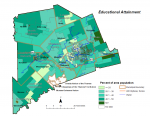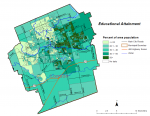Education
Education
Approximately one-third of Middlesex-London residents aged 25 to 64 had not finished any post secondary education according to the 2016 Census. One out of every 10 people aged 25 to 64 (9.9%) had not finished high school or completed any other higher education in Middlesex-London, compared with 10.4% overall in Ontario. The remaining 24.6% had a high school diploma or equivalent (Figure 2.1.1).
Approximately two-thirds (65.4%) of residents of Middlesex-London had completed some type of post-secondary certificate (diploma or degree). This is similar to Ontario (65.1%). Residents of Middlesex-London were more likely to have a college or other non-university certificate or diploma (28.3%) than Ontarians as a whole (24.7%). They were also less likely to have a university degree (28.9%) than Ontarians (31.9%) (Fig. 2.1.1).
Education levels were overall much higher in females and particularly in younger females. Females (68.9%) were more likely than males (61.7%) in Middlesex-London to have a postsecondary education and were also slightly more likely to have post-secondary education than Ontario females (67.2%) (Fig. 2.1.2).
Males (9.1%) were more than twice as likely as females (3.7%) to have completed an apprenticeship, trade certificate or diploma in Middlesex-London (Fig. 2.1.2).
More than 4 out of every 10 (41.4%) younger females aged 25 to 34 had a university bachelor's degree or higher in 2016. This was much higher than males in the same age group (28.1%) (Figure 2.1.3).
There is a substantial difference between the percentage of the youngest (41.4%) and oldest females (21.7%) who have held a university bachelor's degree or higher (Figure 2.1.3).
Younger age groups of both females and males had a higher percent of university degree completion when compared to their older cohorts of the same sex. However, the increase in younger males is not keeping pace with younger females (Figure 2.1.3).
Maps show the wide geographical variation in the percent of the population who had not earned a post-secondary certificate, degree or diploma within Middlesex-London (Fig. 2.1.4) and the City of London (Fig. 2.1.5). Ranges indicate areas where less than 20% of the population did not complete post-secondary education to areas where 50% or more did not have a post-secondary diploma.
Education, along with literacy and skills is considered a key determinant of health.1 Higher levels of educational attainment have been linked with improved health outcomes and healthier behaviours. 2 Education affects health at the individual level (e.g., skill development and access to resources); the community level (e.g., the health-related characteristics of the environments in which people live); and the larger social/ cultural context (e.g., social policies, residential segregation, and unequal access to educational resources). 3
Highest certificate, diploma or degree is the classification used in the census to measure the broader concept of “educational attainment”. It refers to the highest level of education that a person has successfully completed. Someone who has completed one type of certificate, diploma or degree will not necessarily have completed the credentials listed below it. For example, a person with an apprenticeship or trades certificate or diploma may not have completed a high school certificate or diploma.
Ontario Public Health Standards: Requirements for Programs, Services, and Accountability
Population Health Assessment and Surveillance Protocol, 2018
References:
1. Ontario Ministry of Health and Long-Term Care. Health equity guideline [Internet]. Toronto (ON): Queen’s Printer for Ontario; 2018 [cited 2019 Feb 9]. 20 p. Available from: http://www.health.gov.on.ca/en/pro/programs/publichealth/oph_standards/d...
2. Feinstein L, Sabates R, Anderson TM, Sorhaindo A, Hammond C. What are the effects of education on health? In: Desjardins R and Schuller T, editors. Measuring the effects of education on health and civic engagement: proceedings of the Copenhagen Symposium [Internet]. Copenhagen: OECD; 2006 [cited 2018 Feb 6]. p.171-354. Available from: http://www1.oecd.org/education/innovation-education/37425753.pdf
3. Zimmerman EB, Woolf SH, Haley A. Understanding the relationship between education and health: a review of the evidence and an examination of community perspectives [Internet]. Rockville (MD): Agency for Healthcare Research and Quality; 2015 Sept [cited 2018 Feb 6]. [about 48 p.]. Available from: http://www.ahrq.gov/professionals/education/curriculum-tools/population-...
Last modified on: March 18, 2019




